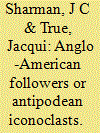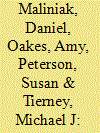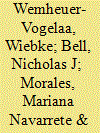|
|
|
Sort Order |
|
|
|
Items / Page
|
|
|
|
|
|
|
| Srl | Item |
| 1 |
ID:
103588


|
|
|
|
|
| Publication |
2011.
|
| Summary/Abstract |
This article examines the results of the world's largest ever survey of international relations (IR) scholars with an eye to establishing the particularities of the discipline in Australia and New Zealand. The survey covered the areas of teaching, research, the structure of the profession and scholars' views on foreign policy. From these results, this paper compares IR in New Zealand and Australia, and discusses the extent to which the discipline in these two countries is distinctive from its overseas counterparts, especially in the United States and the United Kingdom. The particular areas of focus include the degree to which the field in Australasia conforms to or differs from US or Commonwealth identities; epistemological and gender divides; the distinctive foci of what IR scholars in both countries teach and research; which publications are favoured and disfavoured; and the contrasting linkages between academia and the world of government and policy. We conclude with some suggestions about how the field in both countries might be improved.
|
|
|
|
|
|
|
|
|
|
|
|
|
|
|
|
| 2 |
ID:
107811


|
|
|
|
|
| Publication |
2011.
|
| Summary/Abstract |
Using two new data sources to describe trends in the international relations (IR) discipline since 1980-a database of every article published in the 12 leading journals in the field and three surveys of IR faculty at US colleges and universities-we explore the extent of theoretical, methodological, and epistemological diversity in the American study of IR and the relationship between IR scholarship and the policy-making community in the United States. We find, first, that there is considerable and increasing theoretical diversity. Although US scholars believe and teach their students that the major paradigms-realism, liberalism, Marxism, and constructivism-define and divide the discipline, most peer-reviewed research does not advance a theoretical argument from one of these theoretical traditions. There is no evidence, moreover, that realism and its focus on power relations among states dominate, or since 1980 ever has dominated, the literature. Second, although three times as many IR scholars report using qualitative methods as their primary approach, more articles published in the top journals currently employ quantitative tools than any other methodological approach. Third, there exists little epistemological diversity in the field: American IR scholars share a strong and growing commitment to positivism. Finally, there is a disjuncture between what American scholars of IR think about the value of producing policy-relevant work and the actual research they generate: few articles in top journals offer explicit policy advice, but scholars believe that their work is both prescriptive and useful to policymakers.
|
|
|
|
|
|
|
|
|
|
|
|
|
|
|
|
| 3 |
ID:
145117


|
|
|
|
|
| Summary/Abstract |
This article presents findings from the 2014 Teaching, Research, and International Policy (TRIP) Project’s worldwide faculty survey that speak to recent claims in the Global International Relations (IR) Debate. The expansion of the 2014 TRIP faculty survey to thirty-two countries, including more than a dozen non-Western IR communities, enables an initial empirical assessment of some key questions raised by advocates and detractors of “Global IR.” This contribution describes and analyzes scholars’ own perceptions of the IR discipline and adds to the empirical literature on the Global IR Debate. In particular, we address three claims: that IR is a Western/American dominated discipline, that geography is the core dividing line in IR, and that there is a division of labor within IR wherein scholars in the West are responsible for theory production while the non-West supplies data and local expertise for theory testing. We believe that these findings shed light both on how the discipline came to be divided between dominant and marginalized discourses and in which areas this division is most embedded and/or ready to be dismantled.
|
|
|
|
|
|
|
|
|
|
|
|
|
|
|
|
|
|
|
|
|